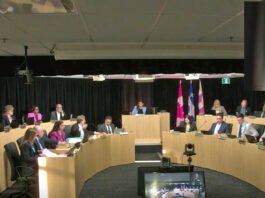The City of Laval announced on Monday that beginning next winter, alternate-side street parking during the winter will become a thing of the past in Laval’s neighbourhoods.
A new policy being implemented by the city will involve resorting to alternate-side parking only when snow removal operations are underway.
Drop in alternate days
According to the city, the number of days where alternate-side parking will be required should drop to 36 per year from the previous 150 days annually. Under the previous system, residents were required to move their vehicles from one side of the street to the other each day during the week between Oct. 3 and April 30.
“This is excellent news for Laval residents,” said Mayor Marc Demers. “This is a measure that will simplify their lives, and without compromising the quality of our maintenance operations. Over the next few winters, we will go even further in improving our offer to citizens and the efficiency of operations by implementing a modern and evolving solution that will make Laval a leader in the management of urban parking.”
New rule to follow
From May to October 2021, seasonal street panels will have added to them the following additional text, “during maintenance operations,” as well as a phone number to call. It will also become possible to subscribe for automated reminder calls, as well as other technological means (text messages, e-mails or through an app) in order to know the state of parking on a given street from Oct. 1 to April 30.
The city notes that this new way of doing things is in itself temporary. Beginning in the spring of 2022, a call for bids will be made in order to install, beginning in the fall that year, illuminated panels that will allow for a more dynamic management of street parking all year long.
Residents were surveyed
According to the city, over the past two winters pilot projects took place in six sectors, involving some 5,300 residents. Various solutions, all proposing restrictions applicable during snow removal operations, were tested and evaluated on the basis of the satisfaction of residents.
According to the results of the evaluation, 78 per cent of residents said that the solution which ended up being adopted was the one which was the best. While 12 per cent said it was neither an improvement nor a setback, 10 per cent said it was definitely a setback.
2020 BIEL report tabled with executive-committee
The 2020 report by the intermunicipal Bureau d’intégrité et d’éthique de Laval-Terrebonne (BIELT) was tabled with the City of Laval’s executive-committee on April 21, suggesting that measures the city took several years ago to bolster ethical practices while safeguarding against ethical breaches are still being enforced.
“The facts contained in our 2020 performance report show clearly the importance of remaining focused on the future, while establishing strategic orientations for the future which will allow the City of Laval to maintain the confidence of its citizens,” said Pierre Brochet, director of the Laval Police Dept. which oversees the city’s role in the BIEL.
Some achievements in 2020 in Laval:
• Elaboration of a new five-year plan 2021-2025;
• 645 inquiry requests.
Some numbers
| Types of dossier | Laval | Terrebonne |
| Tips received | 79 | 16 |
| Tips sent to UPAC | 0 | 0 |
| Inquiries requiring police attention | 18 | 0 |
| Inquiries requiring administrative attention | 45 | 15 |
| Recommendations | 80 | 50 |
To report an ethical situation It is possible to report a situation involving questionable ethical practices to the BIEL, by e-mail at biel@laval.ca, or at bielt@terrebonne.laval.ca, or by telephone at 450 575-BIEL (2435).
City of Lévis subscribes to Laval’s technical support services
During the City of Laval executive-committee’s meeting on April 28, Laval signed an agreement with the City of Lévis by which Lévis will receive technical support from Laval to be able to offer digital services to residents.
Lévis is the first city in the province to sign an agreement of this sort with Laval. The city hopes to share its expertise with other municipalities which would like to improve their practices for governance, citizen relations and technical services.
The City of Laval says its system for processing resident requests allows 24/7 contact with residents to be maintained. The computerized system receives requests, transfers them and processes follow-ups. The system relies on in-person, telephone, online and smartphone app contact tracing, and allows city employees to share contact information.
“We are the first city that has gone as far as this in terms of digital services for its citizens,” said Laval mayor Marc Demers. “And we did this while equipping ourselves with a solution that offers a complete view of the requests of any citizen by our employees. This is part of our determination to improve the citizen’s experience while encouraging ongoing improvement in performance.”
Lévis mayor Gilles Lehouiller said, “Like many municipalities, we are getting 3-1-1 service and a new web site. When we saw Laval’s solution, it seemed only natural to acquire this outstanding expertise and to profit from a proven solution that would save time.
This will allow us to improve our procedures, tools and knowledge in citizen request processing, while accelerating our digital transformation.” The City of Laval claims that its request-processing system speeds things up by up to 66 per cent.
The city says that any sums coming in as a result of the agreement will be reinvested in Laval’s ongoing digitalization. The city also notes that the request-processing system won awards in 2020 from the Réseau de l’informatique municipale du Québec (RIMQ) and the Project Management Institute (PMI) Montréal.





